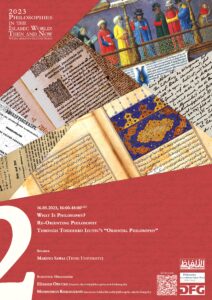What is Philosophy? Re-orienting Philosophy through Toshihiko Izutsu’s “Oriental Philosophy”. Lecture with Dr. Makoto Sawai (Tenri, Japan)
by:
On May, 16th, 4pm the scholarly Networks LOGOS+ and the Colloquium for Philosophy in the MENA-Region is hosting an online talk by Dr. Makoto Sawai (Tenri, Japan) as part of the collaborative lecture series “Philosophies in the Islamic World: Then and Now”, participation is free and without registration.
Toshihiko Izutsu (1914–1993) is perhaps best known for his scholarship on the Qur’an, Sufism, and the Islamic philosophy traditionally called Ḥikmat and ʿIrfān. His broad scholarly interests in Islam are represented by his works like God and Man in the Qur’an (1964), The Concept of Belief in Islamic Theology (1965), Ethico-Religious Concepts in the Qur’an (1966), and A Comparative Study of the Key Philosophical Concepts in Sufism and Taoism: Ibn ʻArabı̄ and Lao-Tzŭ, Chuang-Tzŭ (1966).
However, readers of Izutsu’s Japanese works become aware that he is a scholar constructing his own particular “Oriental philosophy.” Around the 1970’s, he was keenly aware that there had not been an integrated philosophy underlying eastern traditions of thought. In the West, Philosophy has played a principal role in the shaping of academic disciplines and their development. However, there has been no such capital-P “Philosophy” in the East. In the name of an “Oriental philosophy,” thus, Izutsu tries to propose a unified philosophical framework out of the resources of the traditions of Eastern thought.
Izutsu recognized Ibn ʿArabī’s Oneness of Existence (waḥdat al-wujūd) as a representative of Islamic philosophy and considered it as an exemplary framework of his own Oriental philosophy. Oriental philosophy is a philosophical framework grounded in the logical expression of experience. In Western philosophy, experience comes to be considered as a “pure” or “absolute” experience that is meant to serve as the ultimate starting point of all thought. In mysticism or mystical philosophy, on the other hand, primary is a “mystical experience” or unio mystica which Eastern thinkers regard as the foundation of their thoughts. Izutsu bases these conceptions on his own Zen practice and his study of Eastern thought. Out of his understanding of the relationship between mysticism and philosophy, he develops his conception of an “Oriental philosophy.”
In Japan, even today, the term “Oriental philosophy” has not been fully adopted in the academy. In other words, it is taken as commonplace that philosophy means Western philosophy. However, Izutsu tried to investigate an independent Eastern way of doing philosophy, to bring the eastern way of thought to expression. This presentation will trace Izutsu’s construction of an “Oriental philosophy” and consider the characteristics of his understanding of philosophy.
Dr. Makoto Sawai (Tenri, Japan) is a Lecturer of the Oyasato Institute for the Study of Religion, Tenri University. After receiving M.A. from American University in Cairo, he was granted a Ph.D from Tohoku University in 2015. He specializes in Religious Studies and Islamic Studies. He has been particularly interested in symbolism in Islamic thought with regard to the divine names, Adam, life and death. He has published Islam in Adam: An Anthropological Approach to Sufi Thought (in Japanese, Keio University Press, 2020) and “From Mysticism to Philosophy: Toshihiko Izutsu and Sufism” (Journal of the Institute for Sufi Studies Vol. 1-2, 2022).
Upcoming lectures in the lecture series “Philosophies in the Islamic World: Then and Now”:
13.6.2023, 6 – 8 pm: Al-Fārābī – Ein Klassiker und seine Aktualitäten. Speakers: Sarhan Dhouib (Hildesheim) and Nadja Germann (Freiburg im Breisgau)
11.7.2023, 6 – 8 pm: From Medieval Conceptions of Free Will to Modern Notions of Freedom: Between the Theoretical and the Practical. Speakers: Saida Mirsadri (Paderborn) and Zahra Mobalegh (IHCS Tehran, Harvard)
The lectures will be held via zoom.
Venue: Zoom
Please consult the flyer for more information on the venue and on other talks in this series.

